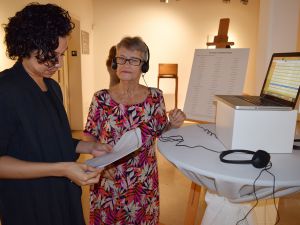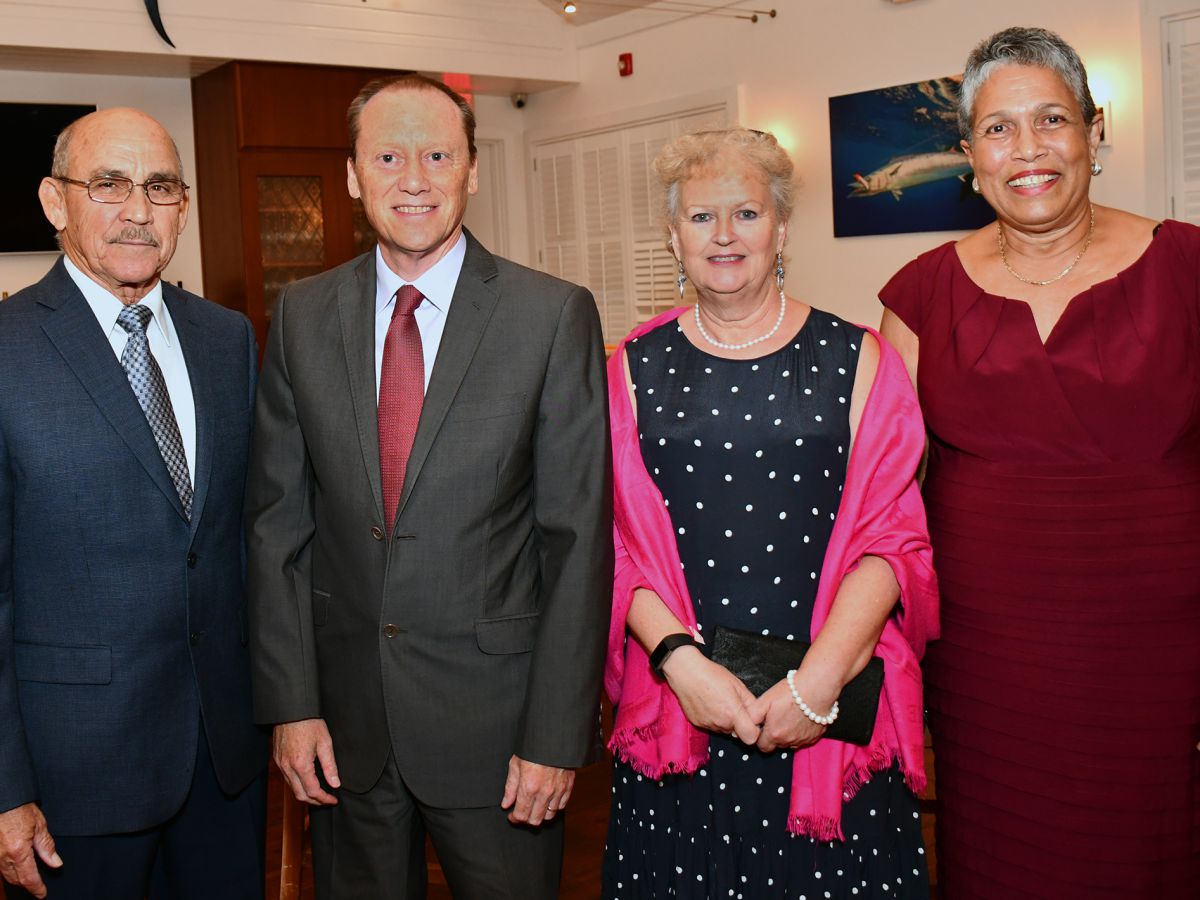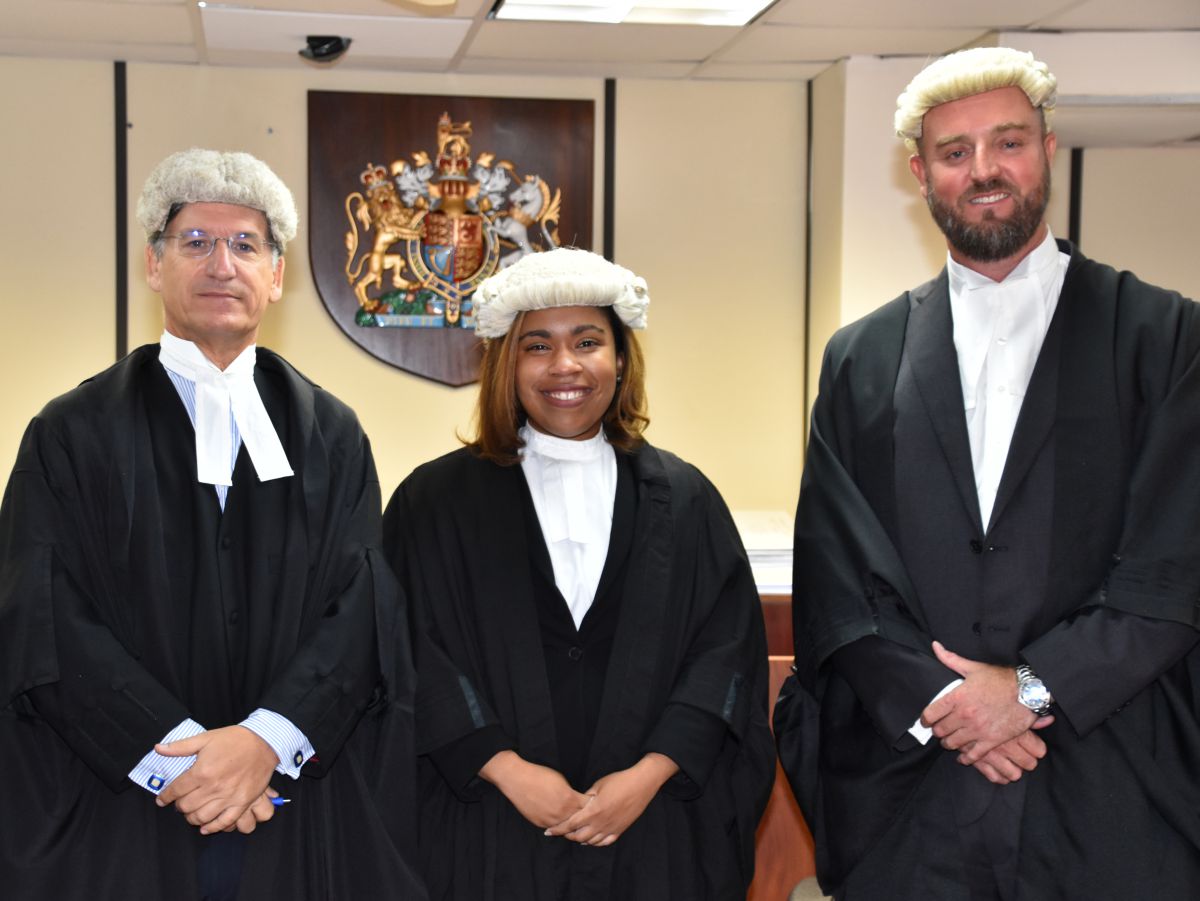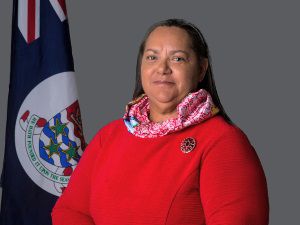
Lise Hurlstone, of the Commissions Secretariat, with Janilee Clifford, who is listening to her reading of section 109 of the Constitution
(CNS Local Life): The Constitutional Commission, together with the Human Rights Commission (HRC), recently launched audio and braille formats of the Cayman Islands Constitution for people with literacy or sight impairments. The project came about when a member of the public who is visually impaired approached the commissions about accessing the Constitution.
There are about 788 people in the Cayman Islands who are considered to have a “sight disability”, stated a joint press release from the two commissions. The audio production marks the first official audio recording of any constitution in Cayman Islands history, and the Constitution Commission believes the braille version marks the first-ever official production of a Cayman Islands government document in that format.
A private event took place at the National Gallery on Thursday, 7 December to celebrate the launch, giving attendees, many of whom had contributed to the audio production, a preview of the projects. Braille copies of the Constitution were also presented to representatives from the Cayman Islands Public Library Service (which will place one in every library), Sunrise Adult Training Centre and the Lighthouse School.
The audio version of the Constitution can be accessed online through the Constitutional Commission and the Human Rights Commission websites.
Constitutional Commission chairman Vaughan Cater said of these new versions: “While the 2009 Constitution is in place, we should not rest on our laurels and consider that all work in this regard is now complete. Instead, we must continue to reach out and engage people on the contents of this important document.
“So, if there is an element of our society who simply cannot access the Constitution, as was the case with the visually impaired, then clearly this is something that needed to be addressed. Through the audio and braille versions of the 2009 Constitution, such persons can now access the contents of the Constitution, utilise it for their needs and hopefully contribute their views on the relevance and appropriateness of the Constitution’s provisions.”
Attendees at the event included Attorney General Samuel Bulgin, and retired school teacher and advocate for the elderly, Janilee Clifford, who lent her voice to the audio version of the document.
“This is an extraordinary and most welcome initiative,” said Bulgin. “If there’s even just one person who benefits from this it will have been worthwhile.”
On her contribution to the effort, Clifford said, “I was honoured to be asked to be one of the speakers on the Constitution audio recording. I only hope they take it into the schools. We’ve lost so much of our culture and heritage, it will be a reminder of what we are and what we stand for today.”
The event was held to fall between two significant dates – International Day of Persons with Disabilities (IDPD), which took place Sunday, 3 December, and International Human Rights Day (IHRD), which was a week later.
HRC chairman James Austin-Smith spoke to the significance of the two new versions of the Constitution. “The Human Rights Commission has had a long-standing history of engagement on the subject of the treatment of persons with disabilities since its inception in 2010,” he said. “The Commission considers this issue of paramount importance, and continues to support endeavours, like the audio and braille constitutions, to ensure that all individuals can participate fully and equally in society.”
The launch of the more accessible formats of the Constitution comes on the heels of IDPD, the intention of which is, amongst other things, to highlight the gains to be derived from fully integrating persons with disabilities in every aspect of political, social, economic and cultural life, stated the press release. The theme for IDPD 2017 is “Transformation towards sustainable and resilient society for all”, which promotes the message that inclusiveness strengthens all parties involved.
On a practical level this means ensuring that there are resources available to help people with disabilities participate fully and equally in our community. This can be achieved by everyday facilities like having elevators in buildings, including access ramps on pavements and the availability of “blue spots” for parking; but it does not stop there, said the release. Also to be considered is whether people with disabilities have proper access to all public facilities, of whatever variety, in Cayman – and not just to public places. Ensuring accessibility for persons with disabilities in Cayman is fundamental to the values of the community and also a requirement of the Constitution, stated the release.
The Bill of Rights in the Constitution helps to enable equal participation in society for persons with disabilities. Section 16 (right to non-discrimination), defines discrimination as “affording different and unjustifiable treatment to different persons on any ground such as sex, race, colour, language, religion, political or other opinion, national or social origin, association with a national minority, age, mental or physical disability, property, birth or other status”.
The right afforded by section 16 is so important it can be considered a cornerstone of human rights of any fair and democratic society, said the release.
For more details, call (244-3685 or email the Commissions Secretariat




